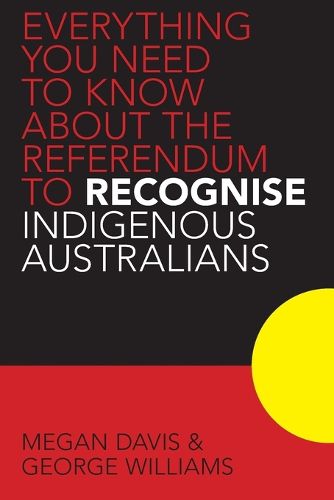Readings Newsletter
Become a Readings Member to make your shopping experience even easier.
Sign in or sign up for free!
You’re not far away from qualifying for FREE standard shipping within Australia
You’ve qualified for FREE standard shipping within Australia
The cart is loading…






This book explains everything that Australians need to know about the proposal to recognise Aboriginal peoples in the Constitution. It details how our Constitution was drafted, and shows how Aboriginal peoples came to be excluded from the new political settlement. It explains what the 1967 referendum - in which over 90% of Australians voted to delete discriminatory references to Aboriginal people from the Constitution - achieved and why discriminatory racial references remain.
With clarity and authority the book shows the symbolic and legal power of such a change and how we might get there. Concise and clear, it is written by two of the best-known experts in the country on matters legal, indigenous and constitutional. Recognise is essential reading on what should be a watershed occasion for our nation.
$9.00 standard shipping within Australia
FREE standard shipping within Australia for orders over $100.00
Express & International shipping calculated at checkout
This book explains everything that Australians need to know about the proposal to recognise Aboriginal peoples in the Constitution. It details how our Constitution was drafted, and shows how Aboriginal peoples came to be excluded from the new political settlement. It explains what the 1967 referendum - in which over 90% of Australians voted to delete discriminatory references to Aboriginal people from the Constitution - achieved and why discriminatory racial references remain.
With clarity and authority the book shows the symbolic and legal power of such a change and how we might get there. Concise and clear, it is written by two of the best-known experts in the country on matters legal, indigenous and constitutional. Recognise is essential reading on what should be a watershed occasion for our nation.
There are strong arguments on both sides of the debate for changing the Australian Constitution to recognise Indigenous Australians and this text looks at the legal and constitutional ramifications of making such a change. The book aims to educate the reader about what they would need to know to make an educated decision if or when a referendum is called on this topic by looking at the Australian Constitution, the 1967 referendum, what changes may be likely and how to go about this for the best chance of success.
Never having read the Australian Constitution before, I found the section on the document fascinating, revealing, but unsurprising in its treatment of Indigenous Australians and initially other non-white ethnic groups: it was born at the time of the White Australia Policy. The authors, experts on Indigenous and constitutional law, have created a book with deliberately accessible language, which does not alienate, and it is not expected that the reader have a prior knowledge of things legal or constitutional.
The content however is not unbiased; it leans heavily towards voting Yes. When discussing the 1967 referendum the authors note the lack of a No campaign at the time – I feel as though this accurately matches the lack of the No side of the debate in this book. The majority of the book is spent discussing why changes should be made, what they should be and how to achieve them, but I only found a few examples where the other side of the argument was even discussed. A very brief mention is made that some Indigenous leaders have reservations, particularly about recognition only being symbolic and it taking away from campaigns towards recognition of Indigenous sovereignty and treaty.
The book’s title and chapter headings do allude to its Yes leaning, so in that sense the authors have not swayed from what I read their intention to be – to inform about the constitution in such a way as to educate and influence the reader towards a Yes vote.